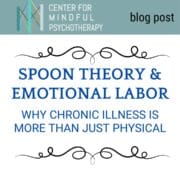
When most people think about chronic illness, they focus on the physical symptoms—the pain, the fatigue, the mobility challenges. But for those living with chronic conditions, the emotional and mental toll can be just as exhausting, if not more. The emotional labor of chronic illness is rarely acknowledged, yet it plays a significant role in daily life.
One way to understand this invisible burden is through Spoon Theory, a concept that has become widely embraced in the chronic illness community. But what does Spoon Theory really illustrate beyond physical fatigue? And how does emotional labor compound the daily challenges of living with a chronic illness?
Let’s dive into the deeper layers of chronic illness, emotional labor, and why people with chronic conditions are managing far more than just physical symptoms.
Find a therapist specializing in chronic illness in our therapist directory or contact us to book an appointment with one of our many therapists.
What Is Spoon Theory?
Spoon Theory was created by Christine Miserandino, a writer and advocate who lives with lupus. During a conversation with a friend who didn’t understand what it was like to have a chronic illness, she grabbed a handful of spoons and used them to illustrate a point:
Imagine that each day, you start with a limited number of spoons. Every activity you do—getting out of bed, making breakfast, taking a shower—costs a spoon. Healthy individuals have an unlimited supply of spoons and don’t have to think about how they spend their energy. But for someone with chronic illness, spoons are finite.
If you use too many spoons in one day, you might not have enough to get through tomorrow. This means people with chronic illness have to carefully plan their energy use, sometimes making difficult choices between basic daily tasks and social or work obligations.
While Spoon Theory is often discussed in terms of physical energy, what’s often overlooked is how it also applies to emotional labor—the unseen effort that people with chronic illness expend every single day.
What Is Emotional Labor in Chronic Illness?
Emotional labor refers to the mental and emotional effort required to navigate interactions, manage feelings, and meet the expectations of others—often while suppressing one’s own struggles. Coined by sociologist Arlie Hochschild, the term originally applied to the workplace (such as service workers having to maintain a cheerful demeanor), but it extends far beyond that.
For people with chronic illness, emotional labor takes many forms:
- Managing Other People’s Reactions to Their Illness – Comforting others, downplaying symptoms to avoid making people uncomfortable, or dealing with skepticism about their condition.
- Advocating for Themselves in the Healthcare System – Fighting for a diagnosis, challenging dismissive doctors, and navigating insurance barriers.
- Masking Pain or Fatigue in Social Situations – Smiling through discomfort, pretending to feel “okay” to avoid awkward conversations, or forcing energy into interactions.
- Educating Others About Their Condition – Constantly explaining their illness, debunking misconceptions, or justifying their need for accommodations.
- Handling Guilt and Internalized Ableism – Feeling like a burden, struggling with not being “productive enough,” or pushing through exhaustion just to meet expectations.
Emotional labor is draining. And just like physical energy, it requires spoons—sometimes even more than physical tasks.
How Spoon Theory and Emotional Labor Intersect
Spoon Theory already illustrates that people with chronic illness have to ration their energy carefully. But what happens when emotional labor is draining spoons just as much as physical activity?
Here’s how they overlap:
- Socializing Costs Extra Spoons – It’s not just about showing up; it’s about managing how others perceive your illness, handling insensitive comments, or pretending to feel better than you do.
- Medical Appointments Aren’t Just Physically Exhausting – The time spent preparing for an appointment, advocating for proper care, and emotionally processing the outcomes can take more spoons than the visit itself.
- Explaining Your Illness Is an Ongoing Job – Whether it’s to family, coworkers, or even strangers, having to justify your experience over and over costs emotional energy that others don’t have to expend.
- Decision Fatigue Adds to Spoon Drain – Every small choice—whether to cancel plans, whether to ask for help, whether to push through pain—requires emotional effort. This daily burden takes a toll.
When people say, “But you don’t look sick,” or “You just need to rest more,” they ignore the hidden exhaustion that comes from the emotional labor of navigating life with a chronic illness.
Why Emotional Labor Is Often Overlooked
Despite its impact, the emotional toll of chronic illness is often invisible and invalidated. Here’s why:
- Chronic Illness Is Expected to Be “Just Physical”
Many people assume that illness is only about pain or fatigue, without realizing the psychological and social burdens that come with it. - The “Be Strong” Narrative Silences Emotional Struggles
People with chronic illness are often praised for their “strength” and “resilience,” which can make it harder for them to openly express frustration, sadness, or exhaustion. - Emotional Work Is Seen as Less Demanding
Society tends to undervalue emotional labor, assuming that mental fatigue isn’t as “real” as physical exhaustion—even though both take a toll. - There’s Pressure to “Stay Positive”
Chronic illness communities often experience toxic positivity, where those struggling are told to “just think positive” instead of having their emotional needs recognized. - Many People Don’t Realize They’re Doing Emotional Labor
Because managing emotions and interactions becomes second nature, many people with chronic illness don’t even recognize the energy it takes until they are completely drained.
Ways to Reduce Emotional Labor and Conserve Spoons
While emotional labor is often unavoidable, there are ways to reduce its toll and conserve your limited energy. Implementing these strategies can help lessen the mental and emotional exhaustion that comes with managing a chronic illness.
1. Set Boundaries Around Emotional Energy
- It’s okay to say, “I don’t have the energy to explain my condition right now.”
- Not everyone deserves access to your emotional energy—choose who you engage with intentionally.
- Identify relationships that drain you versus those that nourish you, and adjust your time and energy investment accordingly.
- If certain people frequently ask invasive or insensitive questions, redirect the conversation instead of feeling obligated to educate them.
- Limit interactions with people who constantly dismiss, invalidate, or challenge your experiences.
- Practice saying “No” without guilt—whether it’s declining social invitations, emotional discussions, or unnecessary obligations.
2. Use Scripts for Difficult Conversations
- Having pre-planned responses for common questions or dismissive comments can save mental energy and prevent emotional frustration.
- Example: “I appreciate your concern, but my condition isn’t something that can be fixed by just resting.”
- If someone tries to give unsolicited health advice, try: “I know you mean well, but I have a treatment plan that works for me.”
- When confronted with skepticism about your illness, use a firm but neutral response: “Just because you can’t see my illness doesn’t mean it isn’t real.”
- If someone pressures you to do something beyond your energy level, say: “I have to prioritize my health today. Thanks for understanding.”
- Prepare short, direct responses for work or social settings where you don’t want to over-explain.
- Keep digital notes or text shortcuts for frequently asked questions so you don’t have to type out long explanations repeatedly.
3. Limit Exposure to Toxic Positivity
- If people constantly push “just be positive” narratives, it’s okay to disengage or change the subject.
- Recognize toxic positivity phrases such as “Everything happens for a reason” or “Just think happy thoughts” and choose not to internalize them.
- Instead of forcing positivity, allow yourself to hold space for both grief and gratitude without judgment.
- Seek spaces where your full experience is validated, not just the parts that make others comfortable.
- If social media worsens feelings of frustration or comparison, curate your feed to follow supportive and understanding voices.
- Be mindful of self-imposed toxic positivity—it’s okay to admit when things are hard instead of forcing yourself to always appear strong.
4. Delegate Advocacy When Possible
- Let a trusted friend or family member help with appointment scheduling, researching treatment options, or handling paperwork when you’re too exhausted.
- If dealing with insurance or medical billing is draining, consider asking someone to assist in making calls or reviewing documents for accuracy.
- Bring a friend, family member, or patient advocate to medical appointments to help ask questions and take notes.
- Use digital tools like medical apps, calendar reminders, or medication tracking apps to reduce the cognitive load of managing your care.
- If you’re part of an online chronic illness community, see if others can share resources or recommendations to make research easier.
- Don’t feel like you have to single-handedly educate everyone—share articles, videos, or resources instead of constantly explaining things yourself.
5. Prioritize Therapy or Peer Support
- Talking to a therapist who understands chronic illness can provide a space to unload emotional burdens without feeling judged.
- Look for a therapist with experience in medical trauma, chronic pain, disability, or illness-related anxiety to ensure they truly understand your challenges.
- Connecting with chronic illness communities (both online and in-person) can provide validation and relief—sometimes, just being understood is enough to lighten the load.
- Join support groups or forums where people share strategies, emotional struggles, and encouragement.
- If formal therapy isn’t accessible, explore self-help workbooks, mindfulness practices, or journaling as a way to process emotions.
- Find safe spaces to vent—whether it’s with trusted friends, a support group, or even anonymous forums where you can express frustration without fear of judgment.
- Remember that self-care isn’t just physical—emotional self-care is just as important in preventing burnout.
How Therapy Can Help
Chronic illness is never just about the physical symptoms—it’s an ongoing negotiation of energy, emotions, and expectations. Spoon Theory helps explain the visible limitations of chronic illness, but it’s equally important to recognize the hidden labor of managing relationships, self-advocacy, and societal attitudes. This emotional burden can be overwhelming, but therapy can help lighten the load.
A therapist who understands chronic illness can provide a space where your experiences are validated, your emotions are processed, and your coping strategies are strengthened. Therapy helps by:
- Providing a judgment-free space to grieve the losses that come with chronic illness without feeling like you need to justify your feelings.
- Helping you navigate medical gaslighting and self-advocacy so that you feel empowered rather than drained by interactions with healthcare providers.
- Developing strategies to manage emotional labor—from setting boundaries to conserving energy in relationships and daily tasks.
- Addressing internalized guilt and self-worth struggles that arise from societal expectations about productivity, resilience, and independence.
- Teaching practical coping tools to manage stress, anxiety, and depression that often accompany chronic illness.
- Supporting you in relationship dynamics by helping you communicate your needs effectively to loved ones without over-explaining or feeling like a burden.
If you live with a chronic illness, your exhaustion is valid—whether it’s from pain, fatigue, or simply the daily effort of existing in a world that often doesn’t understand your struggles. Therapy can be a life-changing resource, not because it “fixes” your condition, but because it gives you the tools to navigate life with more ease, self-compassion, and support.
And if you’re supporting someone with a chronic illness, one of the best things you can do is acknowledge the emotional labor they carry and offer to share the load. Sometimes, the most powerful support isn’t advice or solutions—it’s simply saying, “I see how much you’re carrying, and I’m here.”





